Instructions To Make Your Dog Laugh
Dr. Stanley Coren
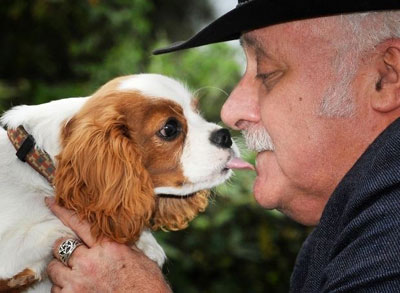 Dr. Stanley Coren is back on Animal Radio to give us specific and detailed instructions on how to make our dogs laugh. Don't be a skeptic until you've heard about the research. Some breeds are more likely to laugh than others. Dr. Coren will share the science behind dog laughter and other body signs.
Dr. Stanley Coren is back on Animal Radio to give us specific and detailed instructions on how to make our dogs laugh. Don't be a skeptic until you've heard about the research. Some breeds are more likely to laugh than others. Dr. Coren will share the science behind dog laughter and other body signs.
Can dogs really laugh? This question was one of those early debates, which was a started up by Konrad Lorenz in his book, "Man Meets Dogs." He noticed that an invitation to play with dogs is followed by a particular expression. So that is where the mouth opens and the tongue is visible lolling out over the front teeth. Then there's a certain kind of panting which the dog gives. He identified this panting with human laughter.
There was also a research team headed by Patricia Simonet at Sierra Nevada College who looked at the laughter sounds in dogs. The way that her team did this was they basically stood around in parks with a parabolic microphone that allowed them to record the sounds that dog's made while they were playing in a distance.
Patricia first described it as sounding to an untrained human ear much like a pant, but with no voicing, more like a breathy sound. To do this yourself, you hold your fingers up to your throat and while you're doing it, you shouldn't feel any vibration. She then took these sounds back and they audio analyzed them and found that they break up into a broad range of frequencies, much broader than you find in regular dog panting. Then she started to play with the sounds. She confirmed that when she paled these recordings of this laugh sound to puppies, they started to run around and acted very happy. It can also be used to calm dogs in an animal shelter if you play it in short bursts.
Dr. Coren has to admit that he was a bit skeptical about the usefulness of these things. So he began to experiment originally with his own dogs. He tells us that you want to do this when your significant other is not around, as they may already have suspicions that you've been a too close to the bottle of Bourbon. But anyway, his original attempts were not very successful. It caused him virtually no response just some puzzled looks from his dogs.
Eventually, Dr. Coren was able to shape a set of sounds, which did evoke interest on the part of his dogs, which required some conscious monitoring. So for him what seems to work is something like, "hhuh-hhah-hhuh-hhah." The first sound, "hhuh," is made with slightly rounded lips. The second sound, "hhah," is made with a sort of an open mouth, smiling expression.
When Dr. Coren does this at a reasonable pace and maintains that little burst, he finds that his dogs come over and look at him and will give that little dog smile or an invitation to play.
 When he's dealing with dogs in a beginner's dog training class, Dr. Coren tries to use it, as he finds that it helps to calm, worried, anxious or shy dogs. It seems to help if you glance at the dog directly, but only for a few brief intervals. You just sort of glance over and look away, by using those sorts of short side-to-side movements of your head.
When he's dealing with dogs in a beginner's dog training class, Dr. Coren tries to use it, as he finds that it helps to calm, worried, anxious or shy dogs. It seems to help if you glance at the dog directly, but only for a few brief intervals. You just sort of glance over and look away, by using those sorts of short side-to-side movements of your head.
There was a study, which was done a number of years ago, and they were looking to see whether there were breed specific differences in the sense of humor in dogs. Do you know some of the most playful breeds?
The Australian Shepherd made the list as well as the Golden Retriever and Labrador Retriever. Other dogs that made the list were the English Springer Spaniel as well as a bunch of terriers like the Cairn Terrier, Airedale Terrier and the Miniature Schnauzer. Shelties made the list as well as the Standard Poodle but not the Toy Poodle for some reason or another.
Bulldogs were at the bottom. This means that they have the worst sense of humor. Other dogs that were at the bottom of the list were Basset Hounds and Bloodhounds, Chihuahuas and some of the Nordic dogs like the Samoyed, who always looks like he's smiling. The Malamute was also near the bottom. The dog that was number one on the list is actually the Irish Setter.
Just like with humans, some humans have a sense of humor and some don't. Then there's also the intelligence in dogs. We know that Golden Retrievers are the fourth most intelligent breed of dogs. However, every now and then you run across a Golden who couldn't outthink a river rock. So there are large individual variations in this sort of thing.
A lot of people would say they really want to breed of dog which has a good sense of humor. But that's a double edge sword, according to Dr. Coren. Because every now and then it's really helpful to have a dog, which when you sit down on the sofa just comes up to you and lies his head down and provides contact comfort. But if you have a dog with a sense of humor, like the Irish Setter for example, he's going to find where you put the leash and he's going to be throwing it in your lap, saying, "Walk me! Walk me!" Or worse, he may find a tennis ball and want you to constantly play.
Besides laughing dogs, one of the most common misinterpretation of dog behavior is based on the myth that a dog wagging his tail is happy and friendly. Dr. Coren says there are two dimensions to the tail. One is the height the tail is held in and the other is the actual movement that the tail makes.
You have to be careful because everybody says if the tail is wagging then the dog is happy. But, if the tail is sort of straight up and it seems to be shaking more than wagging, short little wags back and forth at high speed, that's not a friendly dog. That is a dog that's making a dominant statement. He's basically saying, "Back off, give me some space." A lot of people misread that and send their kid over there and the dog snaps at them. The person then gets upset and says that the dog snapped at their child without any warning. This is not true. The dog was sending the appropriate signal.
The happiest signal of a tail is when it is held sort of moderately low and it's swinging back and forth with very broad swings, which seems to drag the dog's hips with it.
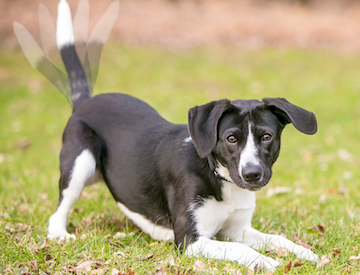 Dr. Coren says he tends to call this his fearless leader wag. This is because while the dog is in fact happy, he's also giving us a sign of submission. He's basically saying, "You are my fearless leader and you will take care of me," making this the friendliest kind of a wag. But if the tail is low and it's wagging slowly, you've got a dog that is not feeling very secure and is feeling kind of anxious.
Dr. Coren says he tends to call this his fearless leader wag. This is because while the dog is in fact happy, he's also giving us a sign of submission. He's basically saying, "You are my fearless leader and you will take care of me," making this the friendliest kind of a wag. But if the tail is low and it's wagging slowly, you've got a dog that is not feeling very secure and is feeling kind of anxious.
You just really need to read the whole pattern. Dogs are really experts at body language and they have to be.
Stanley Coren is Professor Emeritus in the Department of Psychology at the University of British Columbia and an Adjunct Professor at Bergin University. Although best known to the public for his extremely popular and award-winning books on dogs, he is also a highly respected behavioral researcher, a Fellow of the Royal Society of Canada, and was named as one of the 2000 outstanding scientists of the Twentieth Century.
Visit Website
Making Happier and Healthier Pets
Dr. Gary Weitzman, The Complete Guide to Pet Health, Behavior and Happiness
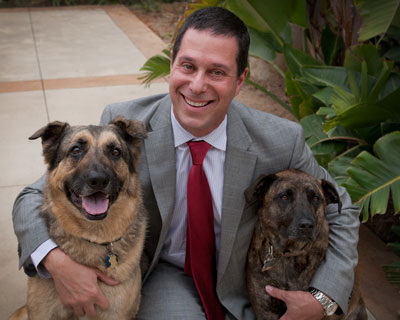 San Diego Humane Society's Top Dog Dr. Gary Weitzman helps animal lovers find the answers to common questions, curiosities and perplexing puzzles. He'll focus on how veterinarians have changed the way they think about vaccines.
San Diego Humane Society's Top Dog Dr. Gary Weitzman helps animal lovers find the answers to common questions, curiosities and perplexing puzzles. He'll focus on how veterinarians have changed the way they think about vaccines.
The Complete Guide To Pet Health, Behavior And Happiness: The Veterinarian's Approach to At-Home Care helps new and seasoned pet owners understand everything about being a responsible pet parent. Dr. Gary Weitzman said it took a while for him to write this book and that there was actually a great amount that didn't make it into the book that perhaps he will use for Volume II.
Have you ever wondered if you and your pet have bonded and if they are happy? The first thing you really need to do is to recognize that you're bringing in an animal where you will be their whole world. Talking about cats and dogs, many times it's the only cat or dog in the household and you have to realize you become their whole world. So there's a responsibility there. Bonding starts with giving them time and giving them attention. When we do this, we are repaid in spades, but that's the first part.
Dr. Weitzman tells us that he has an 11-year-old Pit Bull. The happiest thing in her life is to have her head in his lap while they watch television. He knows she's not watching television, and he likes watching it, so it's perfect. They are bonding. It's just the contact of being with them. You need to give them that time and recognizing you just can't bring a pet into your home and then not pay any attention to that animal.
What about people that think that cats are easier than dogs and if you don't have time for a dog, you should get a cat? That's entirely wrong, according to Dr. Weitzman. He says that cats need as much attention as dogs. Again, especially since we know they're safest in the house, you literally become their entire world and then that house becomes their entire world. We want to make sure that it's a good world, not a prison for them.
So obviously, it's really just giving those animals that make up so much of our lives, the time and the attention that they deserve, and we get well repaid by doing it.
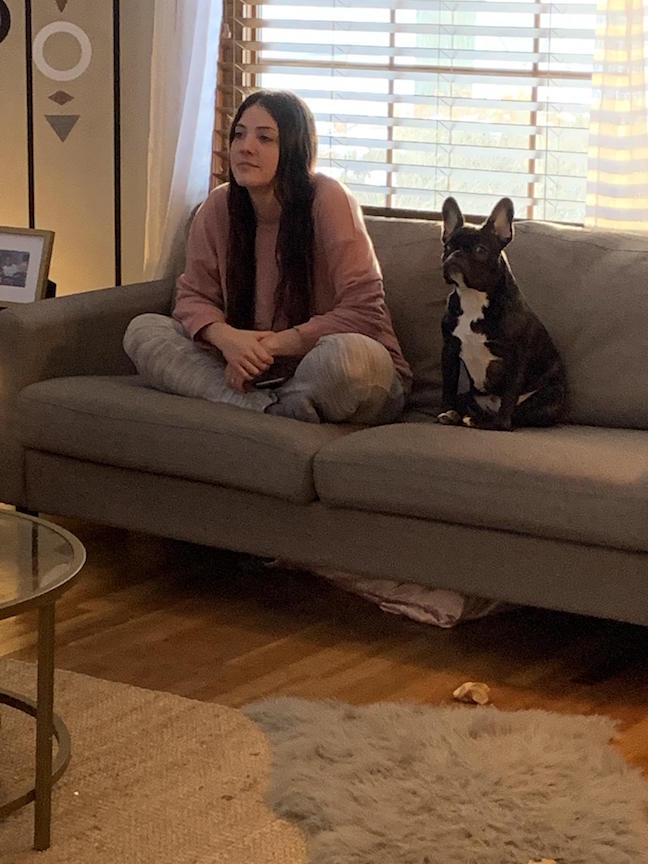 It's no surprise that when you have a multiple cat household and the numbers diminish over time due to the passing of some cats, the remaining cat or cats will have a changed personality. If you only have one cat after a multiple cat household, you literally have now become the only member on the spaceship of your home for that cat. Dr. Weitzman has heard this many times before, where people that have multiple cats, or let's just say they have two, they lose one cat, then the other cat becomes a completely different cat. This makes you wonder what was the stress on that cat from their sibling who is no longer in the home. But a cat can change remarkably in their personality once other cats in the home do not affect them. Often, it's by not having competition or stress from another animal in the same environment.
It's no surprise that when you have a multiple cat household and the numbers diminish over time due to the passing of some cats, the remaining cat or cats will have a changed personality. If you only have one cat after a multiple cat household, you literally have now become the only member on the spaceship of your home for that cat. Dr. Weitzman has heard this many times before, where people that have multiple cats, or let's just say they have two, they lose one cat, then the other cat becomes a completely different cat. This makes you wonder what was the stress on that cat from their sibling who is no longer in the home. But a cat can change remarkably in their personality once other cats in the home do not affect them. Often, it's by not having competition or stress from another animal in the same environment.
Vaccines are a big issue that is also addressed in this book. There has been talk about whether or not animals can get autism from vaccinations (they can't). Then there are the conflicting views. You ask one veterinarian a question about vaccines and you'll get a different answer from another veterinarian.
Vaccinations have evolved over the years, states Dr. Weitzman, when veterinarians used to over vaccinate because they didn't know better. It's just what the science told them 20 years ago. To not have to give a vaccine every year when it's not necessary is the important part. However, to just not give a vaccine is bad. We know that so much disease is controlled now in dogs and cats because of the effectiveness of the vaccine protocols that are being used.
Dr. Weitzman says this is a conversation to always have with your own vet, but do question intelligently whether or not you have an animal at risk for certain things before you vaccinate against it. So a cat that doesn't go outside maybe doesn't need feline leukemia vaccines and doesn't need an FIV vaccine. If you are worried about them, maybe you can do titers instead to see what kind of immunity support your animal has before you vaccinate.
Hopefully, most veterinarians agree pets do need to be vaccinated, but they probably only need to be vaccinated to the point that their immune system is requiring. Right now, that is thought to be about every three years for most of them.
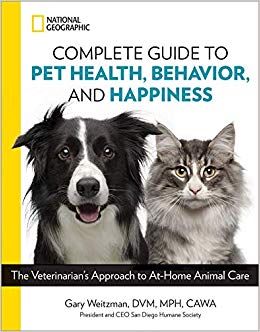 The new rage is CBDs and pets, with many companies manufacturing them. Unfortunately, there's not a lot of research on it. Dr. Weitzman explains that California finally passed some legislation allowing veterinarians to talk to their clients about CBD. Just the conversation of CBD's of veterinarians with their clients was prohibited by law until January of 2019, at least in California. But Dr. Weitzman thinks it's a good thing to actually talk to people about it and try to compile some of this data. We don't even know how it will affect our pets, because we don't even know how it works on people. People at least can tell you what they're experiencing with it.
The new rage is CBDs and pets, with many companies manufacturing them. Unfortunately, there's not a lot of research on it. Dr. Weitzman explains that California finally passed some legislation allowing veterinarians to talk to their clients about CBD. Just the conversation of CBD's of veterinarians with their clients was prohibited by law until January of 2019, at least in California. But Dr. Weitzman thinks it's a good thing to actually talk to people about it and try to compile some of this data. We don't even know how it will affect our pets, because we don't even know how it works on people. People at least can tell you what they're experiencing with it.
Dr. Weitzman wants to be clear that we are talking about CBD, the anti-inflammatory and the non-psychogenic component of marijuana. So we're never talking about THC (which causes the psychological effects) being okay for animals, because it's certainly is not. Everyone is just waiting for the evidence to come in. Right now, it seems as though it probably won't cause harm to animals to try it. But Dr. Weitzman thinks it's on a case-by-case basis and that we still need to try to collect as much data as possible. He thinks the best thing to do right now is to be conservative and collect data, so no one can really make any recommendation for or against the yet.
Visit Website
Are Wildlife Preying on Your Pets? - Dr. Debbie
 As a veterinarian I used to think a dog fight was one of the worst things that could happen to a pet while out walking. But wildlife attacks on pets are a real and present danger. Remember the scene from the Sandra Bullock movie, The Proposal, in which Kevin, the American Eskimo puppy, is carried off by an eagle? Recently Boss, my 16-pound mixed breed dog, became a target of a flying predator not in remote Alaska, but smack dab in the heart of Las Vegas' suburbia.
As a veterinarian I used to think a dog fight was one of the worst things that could happen to a pet while out walking. But wildlife attacks on pets are a real and present danger. Remember the scene from the Sandra Bullock movie, The Proposal, in which Kevin, the American Eskimo puppy, is carried off by an eagle? Recently Boss, my 16-pound mixed breed dog, became a target of a flying predator not in remote Alaska, but smack dab in the heart of Las Vegas' suburbia.
During a walk at our community park before sunrise, I heard a loud beating of wings as a Great Horned Owl swooped down over Boss, my 16-pound terrier mix. My other dog Nikki, a Bouvier des Flanders, ran up to Boss and the owl flew off and retreated to a light pole and sat studying Boss' movements. Fearing the owl appeared ready for a second try, I snatched Boss in my arms and hightailed it out of there.
Boss was lucky to have the deterrent of an eighty pound doggie sister nearby. But not all pets get off so lucky when wildlife predators are concerned. Outdoor cats and dogs may disappear during the night falling victim to a suspected coyote attack. Small pets under 20-pounds can be whisked off by birds of prey. Stories of wildlife attacks such as these occur all the time and the internet reads of horrific stories by owners who lose their small pets to wildlife.
What Animals To Watch For?
Coyotes are found not only in rural areas, but also thrive in metropolitan areas. Mountain lion and bobcats are other predators that are a concern for homeowners in more remote areas or along the outskirts of towns. Birds of prey such as owls, hawks, and eagles are very capable hunters, are protective of nesting sites and can easily carry off small animals two to three times their body weight.
 What Can You Do?
What Can You Do?
Be especially watchful near parks, golf courses or near natural paths that wildlife use as travel corridors, such as flood channels or washes. Remember that an abundance of prey animals like wild bunnies in your community means prime hunting grounds for urban predators.
Don't leave your pets out at night unattended and preferably escort them using a leash. Wildlife rarely will approach a small pet if it is near a human or other larger animals.
Install motion activated lights on property.
Ensure all dog runs have a roof or fencing above to prevent predators from jumping over enclosure walls.
Building high fences and walls may seem like a solution, but predators can easily jump over these. Consider coyote fencing - a style of fencing that may help deter a predator from entering your backyard. Visit Coyote Roller - an ingenious and humane method to prevent a coyotes and other dogs from being able to get over the top of fence with rolling metal bars installed along fence line.
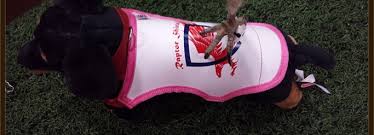 Avoid Attracting Prey Animals
Avoid Attracting Prey Animals
Take steps to make your yard less attractive to nuisance animals like possums and raccoons as well as potential prey animals. Remove wildlife feeding stations like bird feeders. Secure garbage cans. Keep brush trimmed and landscape maintained to avoid hiding sites for animals. Avoid fruit producing trees that serve as food sources. Feed pets indoors to avoid leaving a food source outside for mice, rats or other critters.
Any Other Tools to Protect Pets?
Check out the Raptor Shield, a lightweight protective cape made of polycarbonate plastic - the same compound used in bulletproof shields. This dog vest product was developed to stop a bird of prey's sharp talons from penetrating into small pets.
What To Do If Your Pet Is Targeted By Wildlife?
Make noise, wave arms and throw rocks to drive away animals. Carry a whistle, air horn or pepper spray for defense. Remember that some species of raptors are protected species and harassing or injuring them can result in fines.
Preventative efforts are far more useful than any steps you can take to spook away a predator after an attack occurs. Speak to your neighbors and share information if you spot coyotes or birds of prey in your neighborhood.
Don't get me wrong - I wish no ill will on nature's most efficient predators. I still find those soaring raptors breathtaking and I am awed by the coyote's adaptability, but from now on I'll prefer to watch nature's animal wonders with my little terrier guy safely seated on my lap.
Featured veterinarian known as "Dr. Debbie" on national pet radio program, Animal Radio. Ebook author of "Yorkshire Terriers: How to Be Your Dog's Best Friend"; "Pugs: How to Be Your Dog's Best Friend"; "Mini Schnauzers: How to Be Your Dog's Best Friend"; and "Shih Tzu: How to Be Your Dog's Best Friend." Dr. Debbie's books.
Visit Website
Animal Radio News - Lori Brooks
 Animal Kingdom Pet Shops Faces Many Lawsuits
Animal Kingdom Pet Shops Faces Many Lawsuits
The Animal Kingdom Pet Shop, which has a small chain of stores in Central California, is facing another lawsuit. This one is from a woman who bought a Golden-Doodle from one of the stores for $2,100 last July. She claims that soon after she got her new pet, it started having major medical issues, including bilateral hip dysplasia. Since then, the dog has undergone two surgeries and will likely need several more. Her medical costs have totaled more than $17,000 in only ten months. The pet store has reimbursed her for only $2,900, so she is taking the owners to court, asking for $10,000 in damages. Animal Kingdom is also facing a lawsuit filed by the Animal Legal Defense Fund and another organization alleging the store is involved in a "puppy laundering scheme."
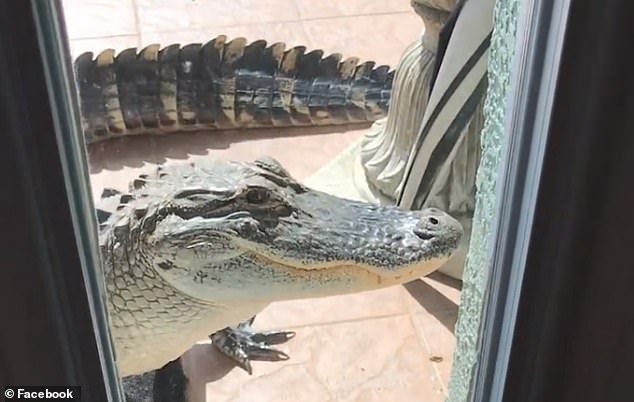 A Strange Houseguest
A Strange Houseguest
A woman arrived home to find an alligator lurking around outside her house. It's amazing how people think in moments like that to take a video, but she did, as the reptile was banging on her glass door. She said she pulled into the garage at her home in Palm Coast and heard her neighbors yelling for her to hurry up and get inside. So she gets in the house and thinks she is safe only to discover the alligator was banging on the glass of her front door. The gator then moved to another area where it was standing on its hind legs looking in a window. A trapper soon arrived at the home to relocate the alligator that was estimated to be 7-8 feet long.
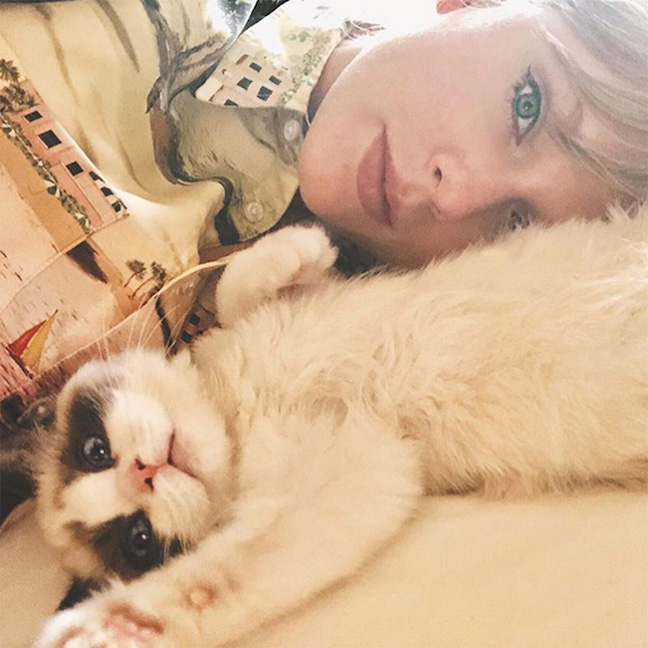 Taylor Swift Loves Her Cats
Taylor Swift Loves Her Cats
Taylor Swift has confirmed that the adorable little kitten featured in her new video ME! Is now hers. The cat's handler asked Swift if she wanted to hold the cat before they shot their scene together, so Taylor says of course, and now the kitten has a home. She's named him Benjamin Button and added him to her furry family, which includes cats Olivia Benson and Meredith Grey, who are named for the Law & Order: SVU and Grey's Anatomy characters.
Hong Kong Tightens Its Animal Laws
Big, new changes are coming to Hong Kong for pet owners and even businesses that deal with animals. People there could soon be punished failing to take care of their animals if they don't walk their dogs, take sick pets to the vet or have them vaccinated, under a plan to tighten Hong Kong's animal protection laws. If approved, the new measures will go into effect in 2021. Under the proposal, owners or those responsible for animals would be required to ensure the animals are kept in good shape and health and provided with clean water and a balanced diet. It would also require owners to seek medical help for sick pets, vaccinate them and meet their "behavioral needs" such as letting them exercise and play regularly. And, abandonment of animals would be considered a breach of the duty of care. The new requirements would also apply to business operators dealing with animals. For example, if a chicken retailer keeps a large number of chickens in a small cage, which would cause mental and physical stress for the chickens, the retailer would be liable under the new law. The code will be tailored towards different animals reflecting their differing needs. For instance, the owner of a large dog is expected to walk his dog more often than the owner of a small dog or an old dog.
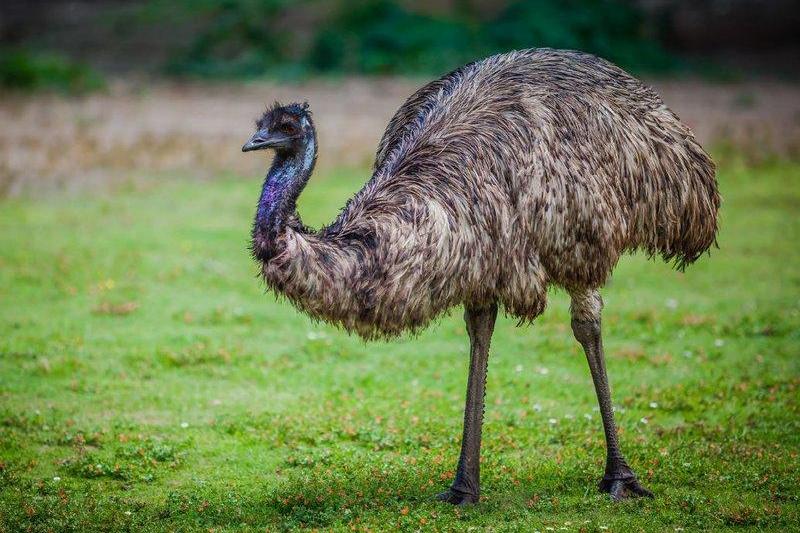 Emu Foot Chase
Emu Foot Chase
An emu found wandering loose in a New York state neighborhood was captured by a local family and spent the night in their basement. Jennifer Oates said the emu was fortunate that ended up at her home because she had experience with the large Australian birds when she was growing up in Texas. Several community members and eventually police chased the emu through town, including an interstate on ramp, before Oates was able to approach it from the side, subdue its legs and coax it to lie down. The large bird spent the night in her basement before being transported to an Animal Park the next day.
 Listen to the entire Podcast of this show (#1014)
Listen to the entire Podcast of this show (#1014)





